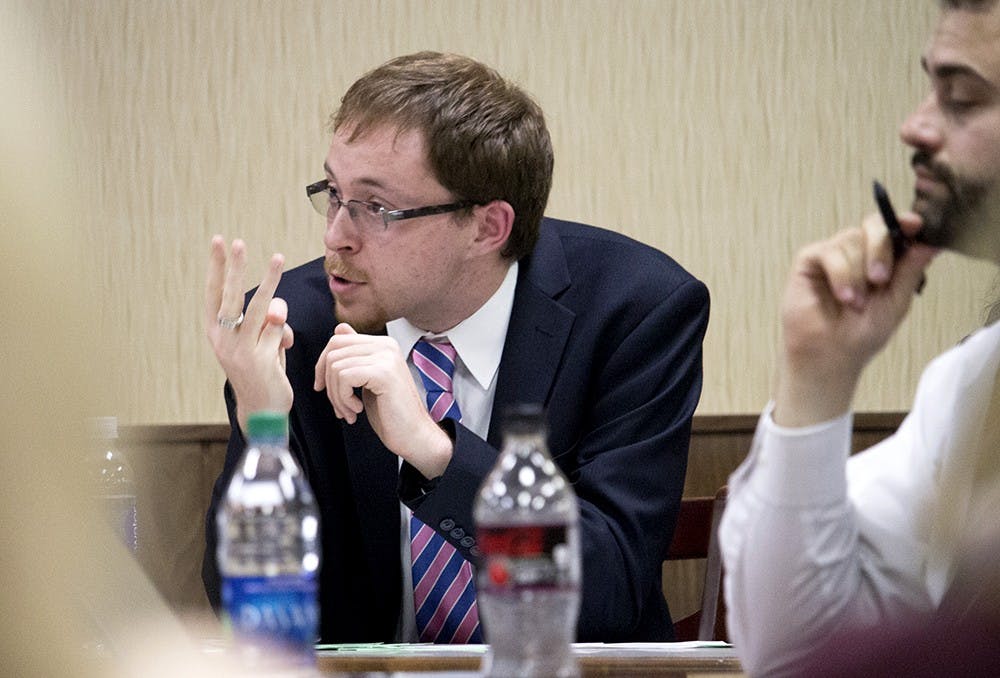The College Democrats began their annual debate Monday evening with the College Republicans by recounting a 2012 scene in an Aurora, Colorado, movie theater.
This scene started the debate’s first topic: gun control, specifically assault weapon regulation.
“Assault weapons belong in theaters of war,” said Ari Hoffman, IU Democrats director of social events. “They don’t belong in movie theaters.”
The College Republicans and the College Democrats also discussed United States’ involvement in Iraq and Syria and ratification of the Paris climate agreement.
The groups met in Wright Formal Lounge and were joined by about 40 audience members and Brian DeLong, director of Indiana Debate and moderator for the night.
Brian Gamache, IU Republicans chairman, debated the conservative side. Gamache argued having stricter regulations on weapons infringes on citizens’ Second Amendment rights. Gamache gave statistics on people killed during the past few years by guns versus how people were killed by using hands, fists or feet. The number of those killed without guns was 660 in 2014.
“Almost three times as many people were killed by bare arms instead of people bearing arms,” Gamache said.
Hoffman said there needs to be increased regulation on assault weapons. All rights have limits. Just as a citizen can’t call “fire” in a public place, a citizen should not be able to easily purchase an assault weapon, he said.
“These things have to have limits when they infringe on the freedoms of other people to be able to operate with safety and with liberty that the Constitution guarantees them,” Hoffman said.
Gamache said the way to reduce gun violence in the U.S. is not through a piece of legislation, such as the Federal Assault Weapons Ban, but through sitting down and having a real conversation about it.
“We need to make sure we’re actually having a conversation that’s going to have a real impact on reducing gun harm in this country,” Gamache said.
The next topic debated was troop deployment in Syria and Iraq to fight ISIS. Nicole Keesling, IU Republicans’ external vice chairman, began the discussion.
Keesling said she was in favor of troop deployment because the U.S. caused the spread of ISIS when it pulled out troops, destabilizing the region. She also said if ISIS is not stopped, it will continue to expand its violence across the world.
When sending troops into these countries, Keesling said the U.S. must work with other countries to defeat them.
Debating the opposing side was IU Democrats President Kegan Ferguson. Ferguson said putting boots on the ground would not do anything in defeating ISIS.
“I want you to remember that every time Nicole says ‘boots on the ground’ she’s talking about our families, our friends and the soldiers that would die on the lines fighting for our country,” Ferguson said.
The final topic debated was the ratification of the Paris climate agreement.
On the Democratic side was Mathi Tamilmani, IU Democrats’ treasurer. Tamilmani said climate change is hurting the U.S. economy and something needs to be done to attempt to solve it. Therefore, the U.S. should support the Paris climate agreement.
“Climate change is slowly but surely — and as of late, not so slowly — becoming one of the worst economic disasters we’ve ever faced in our countries,” Tamilmani said.
On the Republican side was Reagan Kurk, IU Republicans’ technology director. Kurk agreed something needs to be done about climate change, but there need to be more additions to the agreement.
Kurk said the agreement needs to be looked at by the Senate before the U.S. supports it.
“It affects citizens,” Kurk said. “It affects you, and it affects me. We deserve to have a say on whether or not this agreement is ratified.”
As he moderated the debate, DeLong said one of the best benefits of a debate like this is an increase in civil engagement. It’s an opportunity for people who disagree to come together and have civil discussions about it.
“These students are our future leaders,” DeLong said. “They’re the ones who can turn things around.”






